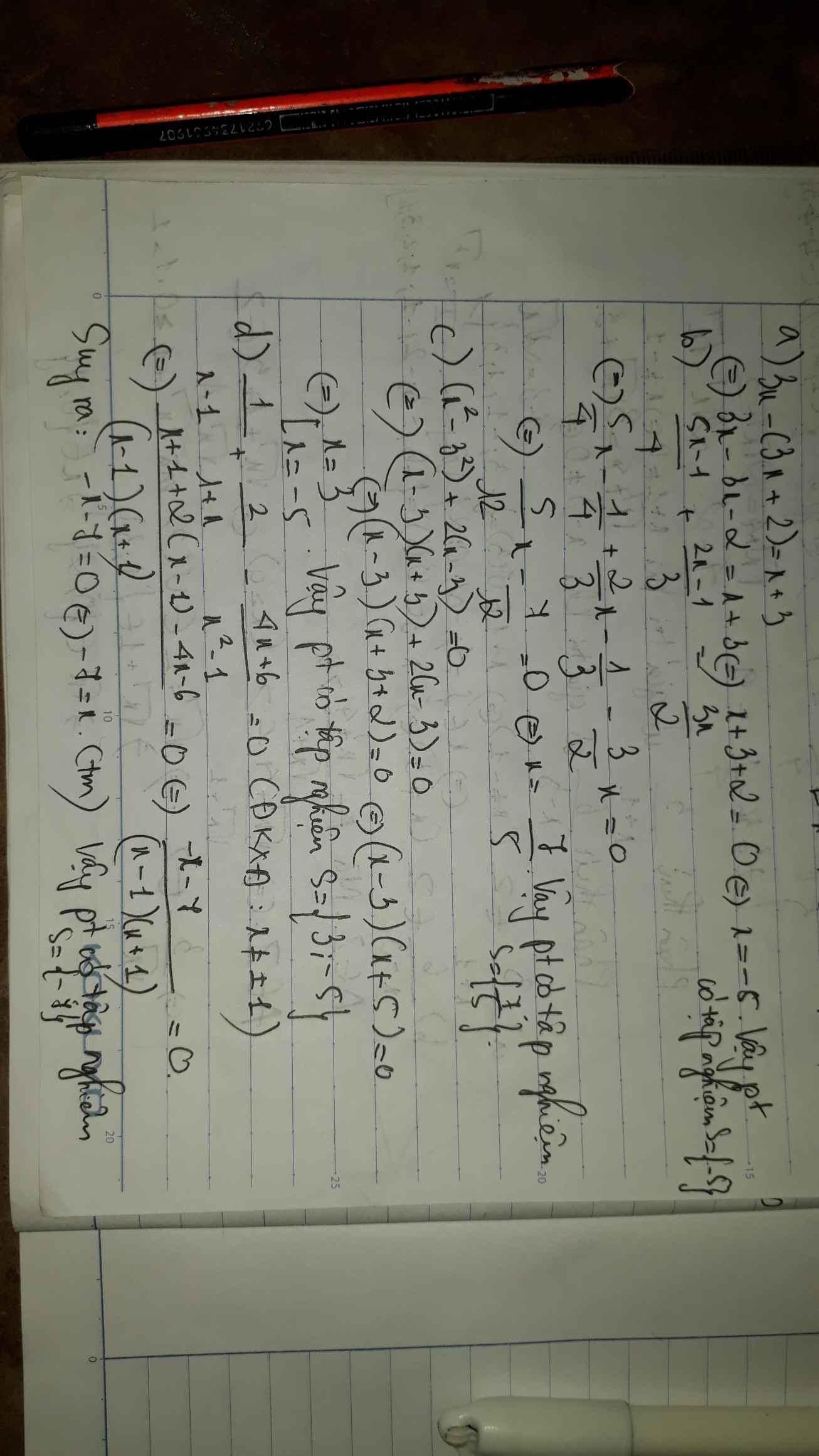Hãy nhập câu hỏi của bạn vào đây, nếu là tài khoản VIP, bạn sẽ được ưu tiên trả lời.

a) Ta có: \(x^2-2x+1=0\)
\(\Leftrightarrow\left(x-1\right)^2=0\)
\(\Leftrightarrow x-1=0\)hay x=1
Vậy: S={1}
c) Ta có: \(x+x^4=0\)
\(\Leftrightarrow x\left(x^3+1\right)=0\)
\(\Leftrightarrow x\left(x+1\right)\left(x^2-x+1\right)=0\)
mà \(x^2-x+1>0\forall x\)
nên x(x+1)=0
\(\Leftrightarrow\left[{}\begin{matrix}x=0\\x+1=0\end{matrix}\right.\Leftrightarrow\left[{}\begin{matrix}x=0\\x=-1\end{matrix}\right.\)
Vậy: S={0;-1}

a) Ta có: \(2x^3+5x^2-3x=0\)
\(\Leftrightarrow x\left(2x^2+5x-3\right)=0\)
\(\Leftrightarrow x\left(2x^2+6x-x-3\right)=0\)
\(\Leftrightarrow x\left[2x\left(x+3\right)-\left(x+3\right)\right]=0\)
\(\Leftrightarrow x\left(x+3\right)\left(2x-1\right)=0\)
\(\Leftrightarrow\left[{}\begin{matrix}x=0\\x+3=0\\2x-1=0\end{matrix}\right.\Leftrightarrow\left[{}\begin{matrix}x=0\\x=-3\\2x=1\end{matrix}\right.\Leftrightarrow\left[{}\begin{matrix}x=0\\x=-3\\x=\dfrac{1}{2}\end{matrix}\right.\)
Vậy: \(S=\left\{0;-3;\dfrac{1}{2}\right\}\)
b) Ta có: \(2x^3+6x^2=x^2+3x\)
\(\Leftrightarrow2x^2\left(x+3\right)=x\left(x+3\right)\)
\(\Leftrightarrow2x^2\left(x+3\right)-x\left(x+3\right)=0\)
\(\Leftrightarrow x\left(x+3\right)\left(2x-1\right)=0\)
\(\Leftrightarrow\left[{}\begin{matrix}x=0\\x+3=0\\2x-1=0\end{matrix}\right.\Leftrightarrow\left[{}\begin{matrix}x=0\\x=-3\\2x=1\end{matrix}\right.\Leftrightarrow\left[{}\begin{matrix}x=0\\x=-3\\x=\dfrac{1}{2}\end{matrix}\right.\)
Vậy: \(S=\left\{0;-3;\dfrac{1}{2}\right\}\)
c) Ta có: \(x^2+\left(x+2\right)\left(11x-7\right)=4\)
\(\Leftrightarrow x^2+11x^2-7x+22x-14-4=0\)
\(\Leftrightarrow12x^2+15x-18=0\)
\(\Leftrightarrow12x^2+24x-9x-18=0\)
\(\Leftrightarrow12x\left(x+2\right)-9\left(x+2\right)=0\)
\(\Leftrightarrow\left(x+2\right)\left(12x-9\right)=0\)
\(\Leftrightarrow\left[{}\begin{matrix}x+2=0\\12x-9=0\end{matrix}\right.\Leftrightarrow\left[{}\begin{matrix}x=-2\\12x=9\end{matrix}\right.\Leftrightarrow\left[{}\begin{matrix}x=-2\\x=\dfrac{3}{4}\end{matrix}\right.\)
Vậy: \(S=\left\{-2;\dfrac{3}{4}\right\}\)

a, <=> (x-1)^3 + x^2(x-1)=0
<=> (x-1)(x^2-2x+1+x^2)=0
<=> (x-1)(2x^2-2x+1)=0
=> x=1
2x^2-2x+1=0 (*)
giải (*):
2x^2-2x+1=0
<=> (x-1)^2 + x^2 > 0
=> * vô nghiệm
=> Pt có nghiệm là 1.
b, x^2+x-12=0
<=> (x-3)(x+4)=0
=> x=3 hoặc x = -4
vậy....
c, 6x^2-11x-10=0
<=> (x-5/2)(6x+4)=0
=> x=5/2 hoặc x= -2/3.
vậy...

a) ( 3.x + 1 ) . ( 7.x + 3 ) = (5.x-7 ) . ( 3.x + 1 )
<=> ( 3.x + 1 ) . ( 7.x + 3 ) - ( 5.x - 7) . ( 3.x + 1 ) = 0
<=> ( 3.x + 1 ) . ( 7.x + 3 - 5.x + 7 ) = 0
<=> ( 3.x + 1 ) . ( 2.x + 10 ) = 0
<=> \(\orbr{\begin{cases}3.x+1=0\\2.x+10=0\end{cases}\Leftrightarrow\orbr{\begin{cases}x=\frac{-1}{3}\\x=-5\end{cases}}}\)
Vậy x = { \(\frac{-1}{3};-5\)}
b) x2 + 10.x + 25 - 4.x . ( x + 5 ) = 0
<=> ( x + 5 )2 -4.x . (x + 5 ) = 0
<=> ( x+ 5 ) . ( x + 5 - 4.x ) = 0
<=> ( x + 5 ) . ( 5 - 3.x ) = 0
<=> \(\orbr{\begin{cases}x+5=0\\5-3.x\end{cases}\Leftrightarrow\orbr{\begin{cases}x=-5\\x=\frac{5}{3}\end{cases}}}\)
Vậy x = \(\left\{\frac{5}{3};-5\right\}\)
c) (4.x - 5 )2 - 2. ( 16.x2 -25 ) = 0
<=> ( 4.x-5)2 -2 .( 4.x-5) .( 4.x + 5 ) = 0
<=> ( 4.x -5 )2 - ( 8.x+ 10 ) . ( 4.x -5 ) = 0
<=> ( 4.x -5 ) . ( 4.x-5 - 8.x - 10 ) = 0
<=> ( 4.x - 5 ) . ( -4.x - 15 ) = 0
<=> \(\orbr{\begin{cases}4.x-5=0\\-4.x-15=0\end{cases}\Leftrightarrow\orbr{\begin{cases}x=\frac{5}{4}\\x=\frac{-15}{4}\end{cases}}}\)
Vậy x = \(\left\{\frac{5}{4};\frac{-15}{4}\right\}\)
d) ( 4.x + 3 )2 = 4. ( x2 - 2.x + 1 )
<=> 16.x2 + 24.x + 9 - 4.x2 + 8.x - 4 = 0
<=> 12.x2 + 32.x + 5 =0
<=> 12. ( x +\(\frac{1}{8}\) ) . ( x + \(\frac{5}{2}\)) = 0
<=> \(\orbr{\begin{cases}x+\frac{1}{6}=0\\x+\frac{5}{2}=0\end{cases}\Leftrightarrow\orbr{\begin{cases}x=\frac{-1}{6}\\x=\frac{-5}{2}\end{cases}}}\)
Vậy x = \(\left\{\frac{-1}{6};\frac{-5}{2}\right\}\)
e) x2 -11.x + 28 = 0
<=> x2 -4.x - 7.x + 28 = 0
<=> ( x - 7 ) . ( x - 4 ) = 0
<=> \(\orbr{\begin{cases}x-7=0\\x-4=0\end{cases}\Leftrightarrow\orbr{\begin{cases}x=7\\x=4\end{cases}}}\)
Vậy x = { 4 ; 7 }
f ) 3.x.3 - 3.x2 - 6.x = 0
<=> 3.x. ( x2 -x - 2 ) = 0
<=> 3.x. ( x - 2 ) . ( x + 1 ) = 0
<=> \(\orbr{\begin{cases}x-2=0\\x+1=0\end{cases}\Leftrightarrow\orbr{\begin{cases}x=2\\x=-1\end{cases}}}\)
\([x=0\) \([x=0\)
( Lưu ý :Lưu ý này không cần ghi vào vở : Chị nối 2 ý đó làm 1 nha cj ! )
Vậy x = { 2 ; -1 ; 0 }

a, (3x+1)(7x+3)=(5x-7)(3x+1)
<=> (3x+1)(7x+3)-(5x-7)(3x+1)=0
<=> (3x+1)(7x+3-5x+7)=0
<=> (3x+1)(2x+10)=0
<=> 2(3x+1)(x+5)=0
=> 3x+1=0 hoặc x+5=0
=> x= -1/3 hoặc x=-5
Vậy...
a) (3x - 2)(4x + 5) = 0
⇔ 3x - 2 = 0 hoặc 4x + 5 = 0
1) 3x - 2 = 0 ⇔ 3x = 2 ⇔ x = 2/3
2) 4x + 5 = 0 ⇔ 4x = -5 ⇔ x = -5/4
Vậy phương trình có tập nghiệm S = {2/3;−5/4}
b) (2,3x - 6,9)(0,1x + 2) = 0
⇔ 2,3x - 6,9 = 0 hoặc 0,1x + 2 = 0
1) 2,3x - 6,9 = 0 ⇔ 2,3x = 6,9 ⇔ x = 3
2) 0,1x + 2 = 0 ⇔ 0,1x = -2 ⇔ x = -20.
Vậy phương trình có tập hợp nghiệm S = {3;-20}
c) (4x + 2)(x2 + 1) = 0 ⇔ 4x + 2 = 0 hoặc x2 + 1 = 0
1) 4x + 2 = 0 ⇔ 4x = -2 ⇔ x = −1/2
2) x2 + 1 = 0 ⇔ x2 = -1 (vô lí vì x2 ≥ 0)
Vậy phương trình có tập hợp nghiệm S = {−1/2}
d) (2x + 7)(x - 5)(5x + 1) = 0
⇔ 2x + 7 = 0 hoặc x - 5 = 0 hoặc 5x + 1 = 0
1) 2x + 7 = 0 ⇔ 2x = -7 ⇔ x = −7/2
2) x - 5 = 0 ⇔ x = 5
3) 5x + 1 = 0 ⇔ 5x = -1 ⇔ x = −1/5
Vậy phương trình có tập nghiệm là S = {−7/2;5;−1/5}

a) ĐKXĐ: \(x\ne0\)
Ta có: \(\dfrac{3x^2+7x-10}{x}=0\)
Suy ra: \(3x^2+7x-10=0\)
\(\Leftrightarrow3x^2-3x+10x-10=0\)
\(\Leftrightarrow3x\left(x-1\right)+10\left(x-1\right)=0\)
\(\Leftrightarrow\left(x-1\right)\left(3x+10\right)=0\)
\(\Leftrightarrow\left[{}\begin{matrix}x-1=0\\3x+10=0\end{matrix}\right.\Leftrightarrow\left[{}\begin{matrix}x=1\\3x=-10\end{matrix}\right.\Leftrightarrow\left[{}\begin{matrix}x=1\\x=-\dfrac{10}{3}\end{matrix}\right.\)
Vậy: \(S=\left\{1;-\dfrac{10}{3}\right\}\)
a/ \(\dfrac{3x^2+7x-10}{x}=0\)
\(< =>3x^2+7x-10=0\)
\(< =>3x^2+10x-3x-10=0\)
\(< =>\left(3x^2+10x\right)-\left(3x+10\right)=0\)
\(< =>x\left(3x+10\right)-\left(3x+10\right)=0\)
\(< =>\left(3x+10\right)\left(x-1\right)=0\)
\(=>\left\{{}\begin{matrix}3x+10=0=>x=-\dfrac{10}{3}\\x-1=0=>x=1\end{matrix}\right.\)
Vậy tập nghiệm của .....

a: Ta có: \(3x-\left(3x+2\right)=x+3\)
\(\Leftrightarrow x+3=-2\)
hay x=-5
b: Ta có: \(\dfrac{5x-1}{4}+\dfrac{2x-1}{3}=\dfrac{3x}{2}\)
\(\Leftrightarrow15x-3+8x-4=18x\)
\(\Leftrightarrow5x=7\)
hay \(x=\dfrac{7}{5}\)

a, x2-2x+1
= (x-1)2
c, x+x4=0
=>x(x+3)=0
=>x=0 hoặc x+3=0
=>x=0 hoặc x = -3